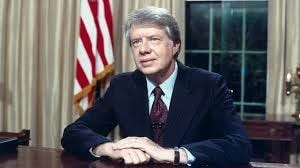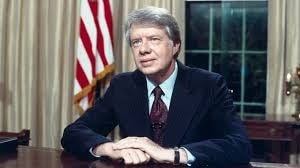Happy 2025!
I think I’ve written on here before how the roots of my political junkie status began in 1968 when I was in 8th grade. We had to run in-class campaigns for the presidential candidates and I selected Bobby Kennedy (with surprising support from my Very Republican Grandmother). I was devastated when he was assassinated (on the heels of MLK’s).
I couldn’t yet vote in the 1972 election as my 18th birthday was eleven days after election day. I don’t think that my political acumen was well developed then. I’m not sure who I would have voted for (I fear it was Nixon). Watergate was a big influence on my development and created a desire to see ethical government.
So my first ballot cast in a presidential election went to Jimmy Carter. I knew that he was from outside the Washington establishment and had been a nuclear engineer, peanut farmer, and governor.
What really caught my attention, however, was that he said he was “born again”. While this phrase was the title of Chuck Colson’s autobiography (written while serving time for Watergate-related infractions) and does appear in John 31, Carter’s use of the term as a self-descriptor was different.
Those of us who were politically engaged in 1976 know that Carter gave his infamous interview with Playboy magazine, identifying with Jesus’ proclamation that we may have lust in our hearts. But as he explained theology in a very non-theological publication, it drew attention to the whole enterprise of being a Born Again Evangelical.
It was only a couple of years later that both Time and Newsweek declared it to be “The Year of the Evangelicals”. Within a decade, major sociological research appeared trying to sort out who these evangelicals were and what made them tick.2 Polling organizations began asking if respondents were Born Again or Evangelical. This, in turn, led to our now infamous 81% evangelical support for Donald Trump.
I probably couldn’t have identified it at the time, but I think Carter’s evangelical status was a major factor in my switching my professional interests from criminal justice to the sociology of religion with a career-long interest in evangelicalism and its changes.
Randall Balmer, who wrote an excellent biography of Carter titled Redeemer, recently addressed Carter’s religious legacy for Religion News Service.
Carter’s pledge that he would “never knowingly lie” to the American people struck a chord, and although Carter’s term as president is generally regarded as something less than unalloyed success, no one — not even his legion of detractors — has credibly accused him of misleading the American people during his time in office. Put another way, Carter, whatever his shortcomings as president, redeemed the presidency from the culture of deceit so abundantly evident during the Nixon administration.
But one of the many paradoxes surrounding Carter’s presidency is that he was unable to fend off the deception of his fellow evangelicals, including a couple of preachers named Jerry Falwell and Billy Graham. Their duplicity may not have been responsible for Carter’s political demise, but it certainly contributed.
Evangelicals in the South didn’t know what to do with Carter. He was a Baptist but was progressive on civil rights and women’s issues. Yet here he was, the national image of what it meant to be an ethically driven, Christian leader.
In The Kingdom, The Power, and The Glory, Tim Alberta has a wonderful chapter on the birth of Falwell’s Moral Majority beginning with the bicentennial celebration of America on the hillside near Thomas Road Baptist. From the very beginning, it was an attempt to carve out politically conservative boundaries of what was Right which put Carter on the wrong side of the line.
In his biography, Balmer describes some steps that Carter might have taken to shore up his support among the Evangelical leadership, especially in the South. Looking back, it probably wouldn’t have made much difference. In his RNS piece, Balmer notes why.
Following the meeting, Falwell began recounting to various audiences and political rallies across the country how he had asked Carter why “practicing homosexuals” served on the White House staff. Carter, according to Falwell, replied, “I am president of all the American people and I believe I should represent everyone.” Falwell’s rejoinder: “Why don’t you have some murderers and bank robbers and so forth to represent?”
As a tape recording of the White House gathering demonstrated, however, the president made no such comment. Falwell, in fact, had fabricated the entire exchange in an apparent attempt to discredit Carter in the eyes of evangelicals.
Carter’s Christian sensibilities could take him to fairly prophetic language, although we didn’t recognize it at the time. Consider the “Crisis of Confidence” speech he delivered in 1979 (wrongly panned as the ‘Malaise Speech”). In the speech to the nation, he clarified that something had made a profound shift post-Watergate and that it wasn’t good.
In a nation that was proud of hard work, strong families, close-knit communities, and our faith in God, too many of us now tend to worship self-indulgence and consumption. Human identity is no longer defined by what one does, but by what one owns. But we've discovered that owning things and consuming things does not satisfy our longing for meaning. We've learned that piling up material goods cannot fill the emptiness of lives which have no confidence or purpose.
The symptoms of this crisis of the American spirit are all around us. For the first time in the history of our country a majority of our people believe that the next five years will be worse than the past five years. Two-thirds of our people do not even vote. The productivity of American workers is actually dropping, and the willingness of Americans to save for the future has fallen below that of all other people in the Western world.
As you know, there is a growing disrespect for government and for churches and for schools, the news media, and other institutions. This is not a message of happiness or reassurance, but it is the truth and it is a warning.
These changes did not happen overnight. They've come upon us gradually over the last generation, years that were filled with shocks and tragedy.
As I read these words today, I’m struck with how astute Carter’s moral analysis was. We have seen for decades how the “right-track wrong-track” numbers have continued to shift toward the latter. Many economists and social scientists — Robert Reich was making this point this point 15 years ago — have documented how the shifts in our economic structures have resulted in growing inequality and the shift from worker-centered to an investor-centered. The true malaise of this recent election is testimony to the fact that things are on a challenging course.
Maybe if Carter could have made these claims in the absence of an international energy crisis3, “stagflation”, and a hostage crisis, people would have heeded his warnings. As we anticipate the beginning of the next presidential administration, this critique is more important than it was in 1979.
The days since Carter’s death have been filled with analysis of the strengths and weaknesses of his policies. There are those who thought his human rights appeals were uneven, others who thought he wasn’t enough of a Russia hawk, still other theobros who want to denounce treatment of him as a true evangelical.
I’m not prepared to say he was a great president. But he was a moral one and we should pay attention to his example, not just in the Habitat for Humanity years but what it means for a president to be concerned about bigger issues than what happens to the stock market or the trade deficit.
Here’s a Q&A from the Billy Graham Evangelical Association dismissing Carter’s role here. But the questioner made the same connection I did.
James Davison Hunter and Christian Smith both wrote books titled American Evangelicalism. The contrast between these two visions is central to my book.
If you read the full text of the speech, he makes an abrupt turn from his moral economic argument to policy proposals about energy. Probably tried to do too much in one speech.




